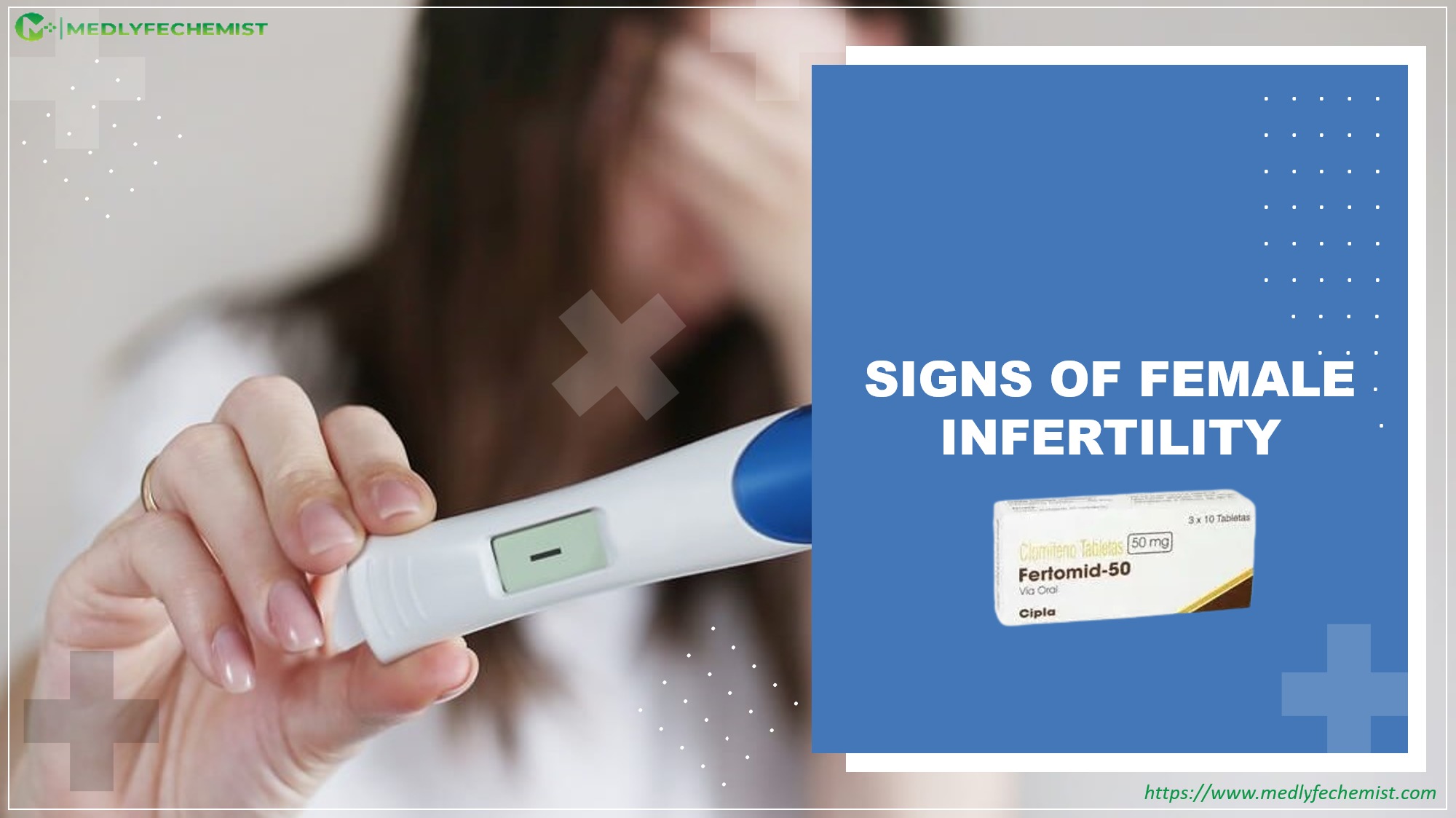Understanding Fertility Issues
Many women experience fertility issues at some point in their lives, making it difficult for them to conceive. Fertility issues can result from problems with ovulation or irregularities in the menstrual cycle. Infertility can also be caused by hormonal imbalances that prevent the egg from being released or fertilized.
When a woman is trying to conceive and is unable to do so despite having regular intercourse, it is important to understand the underlying fertility issues that may be contributing to the problem. Consulting with a healthcare provider is essential to determine the cause of the issue and find effective treatments, such as Fertomid.
Types of Fertility Issues
Ovulation Problems: These occur when the ovaries do not release an egg or release an egg irregularly, making it difficult to conceive.
Menstrual Cycle Irregularities: These occur when the menstrual cycle is longer or shorter than the usual 28-day cycle, making it difficult to predict ovulation and conceive.
Infertility: This is a medical condition that affects both men and women and is diagnosed after a couple has been unable to conceive after one year of trying. Infertility can be caused by a variety of factors, including ovulation problems, hormonal imbalances, and genetic issues.
Polycystic Ovary Syndrome (PCOS): This is a hormonal disorder that affects women of reproductive age and is caused by high levels of androgens, also called male hormones. Women with PCOS may experience irregular menstrual cycles, ovulation problems, and infertility.
Fertility issues can be stressful and frustrating, but there are many treatments available that can help women achieve their dream of becoming a mother. Fertomid is one such treatment that has helped many women overcome their fertility issues and conceive.
Introduction Fertomid :
Fertomid (Clomiphene citrate) is a medication used to induce ovulation in women who have difficulty ovulating. It is a non-steroidal medication that works by binding to the estrogen receptors in the hypothalamus, which is responsible for regulating the menstrual cycle. This binding activity leads to the stimulation of the pituitary gland to release more follicle-stimulating hormone (FSH) and luteinizing hormone (LH), which in turn stimulates the growth and release of mature eggs from the ovaries.
Fertomid is a tablet administered orally for five days, typically beginning on the third to fifth day of a menstrual cycle. Treatment may be continued for up to six cycles, depending on the response of the individual patient and healthcare provider recommendations.
Fertomid is commonly used to treat anovulation, a condition where the ovaries do not regularly produce eggs, or oligo-ovulation, where the ovaries produce inadequate amounts of eggs. It is also sometimes used in combination with other fertility medications, such as gonadotropins, to enhance ovulation and increase the chances of pregnancy.
In addition to being used for infertility treatment, Fertomid has also been used off-label to treat certain hormonal imbalances in men, such as hypogonadism and gynecomastia.
It's important to note that Fertomid should be used only under the supervision of a healthcare professional, as self-medication and incorrect use of Clomiphene citrate can lead to complications and may not improve ovulation or increase fertility.
How Fertomid Works
Fertomid works by stimulating ovulation in women who are having trouble getting pregnant. The medication contains clomiphene citrate, which helps to regulate the production of follicle-stimulating hormone (FSH) and luteinizing hormone (LH) in the body.
These two hormones are critical for ovulation, as they stimulate the development of follicles in the ovaries and trigger the release of eggs. In women with fertility problems, this process may not be happening correctly, which can make it difficult to conceive.
By regulating FSH and LH production, Fertomid helps to improve ovulation and increase the chances of pregnancy. The medication is especially effective in women with ovulation problems caused by hormonal imbalances, including those with polycystic ovary syndrome (PCOS).
It's important to note that Fertomid is not a hormone itself, but rather a selective estrogen receptor modulator (SERM). It works by blocking estrogen receptors in the brain, which causes the body to produce more FSH and LH.
Overall, Fertomid is a safe and effective medication for women struggling with fertility issues. By regulating hormone production and stimulating ovulation, it can help improve the chances of pregnancy and bring hope to those who are struggling to conceive.
Who Needs Fertomid Treatment
Fertomid is a medication that is prescribed to women who are struggling with infertility, ovulation problems, hormonal imbalances, or PCOS. If you have been trying to conceive for a while with no success, your doctor may recommend Fertomid as a treatment option.
Infertility can be caused by a variety of factors, including age, medical conditions, and lifestyle choices. Fertomid is often prescribed to women who have trouble ovulating on their own, or who have irregular menstrual cycles. Additionally, women with hormonal imbalances, such as those with PCOS, may benefit from Fertomid treatment.
If you are struggling to get pregnant, it's important to talk to your doctor about your options. Fertomid may be a safe and effective way to improve your chances of conceiving and starting a family.
Fertomid Dosage and Administration
It is important to take Fertomid exactly as prescribed by your healthcare provider. The recommended dosage and duration of treatment may vary depending on your individual needs and medical history.
In general, Fertomid is taken orally for five days, starting on the fifth day of your menstrual cycle. Your doctor may recommend additional cycles of treatment if you do not conceive after the first cycle.
It is important to take Fertomid at the same time every day to maintain consistent levels of the medication in your body. Be sure to follow the instructions provided with your prescription, and do not take more or less of the medication than prescribed.
If you miss a dose of Fertomid, take it as soon as you remember. If it is almost time for your next dose, skip the missed dose and continue with your regular dosing schedule.
Important tips for taking Fertomid:
- Take the medication with a full glass of water to help prevent stomach upset.
- Avoid alcohol and smoking while taking Fertomid, as these may interfere with its effectiveness.
- If you experience any side effects while taking Fertomid, contact your doctor right away to discuss possible solutions or alternative treatments.
- Keep track of your menstrual cycle and ovulation patterns to better understand your fertility and monitor your progress during treatment.
Remember, Fertomid is a prescription medication that should only be taken under the guidance of a healthcare provider. If you have any questions or concerns about your treatment plan, be sure to discuss them with your doctor.
Potential Side Effects of Fertomid
Like any medication, Fertomid may cause side effects in some women. While most side effects are mild and go away on their own, some can be serious and require medical attention. It is important to discuss the potential side effects of Fertomid with your healthcare provider before starting treatment.
Possible Side Effects
The most common side effects of Fertomid include hot flashes, mood swings, and breast tenderness. Other possible side effects may include headache, nausea, blurred vision, and dizziness. In rare cases, Fertomid may cause ovarian hyperstimulation syndrome (OHSS), a serious condition that can lead to fluid build-up in the abdomen and chest. Symptoms of OHSS include severe abdominal pain, swelling, and shortness of breath.
Managing Side Effects
If you experience side effects while taking Fertomid, there are steps that you can take to manage them. For example, you can try to reduce hot flashes by dressing in layers and avoiding spicy foods. If you experience mood swings, you can try relaxation techniques such as yoga or meditation. Breast tenderness can be managed with a supportive bra.
When to Seek Medical Attention
If you experience any severe or persistent side effects while taking Fertomid, you should contact your healthcare provider right away. This includes symptoms of OHSS such as severe abdominal pain, swelling, and shortness of breath. Your healthcare provider may adjust your dosage of Fertomid or recommend a different treatment if side effects become too severe.
Minimizing the Risk of Side Effects
To reduce the risk of side effects while taking Fertomid, it is important to follow your doctor's instructions carefully. You should never take more than the recommended dosage of Fertomid, and you should always take it at the same time each day. It is also important to avoid drinking alcohol while taking Fertomid, as this can increase the risk of side effects. If you have any concerns about taking Fertomid, talk to your healthcare provider.
Success Rates of Fertomid Treatment
Studies have shown that Fertomid can be an effective treatment for women struggling with fertility issues. According to research, the medication can increase the chances of ovulation and pregnancy in women with ovulatory dysfunction.
In one study, over 50% of women with ovulatory dysfunction who took Fertomid were able to conceive within six months of starting treatment. This success rate increased to over 80% after 12 months of treatment.
Another study found that Fertomid was successful in inducing ovulation in up to 80% of women with polycystic ovary syndrome (PCOS).
It is important to note that success rates may vary depending on the individual and their specific fertility issues. Factors such as age and overall health can also affect the success of Fertomid treatment.
Monitoring Progress
During Fertomid treatment, doctors will monitor progress through regular ultrasounds and blood tests to track ovulation and adjust dosage as needed. This ensures that treatment is tailored to each patient and their individual needs, maximizing their chances of success.
If you are struggling with fertility issues, talk to your healthcare provider about whether Fertomid may be a suitable treatment option for you.
Precautions and Warnings
While Fertomid is generally considered safe and effective for treating fertility issues, there are certain precautions and warnings that should be kept in mind.
Before Taking Fertomid
Before beginning treatment with Fertomid, it is important to inform your doctor of any medical conditions you may have, including liver disease, ovarian cysts, or abnormal vaginal bleeding. You should also disclose any other medications or supplements you are taking, as these may interact with Fertomid and cause unwanted side effects.
It is also important to note that Fertomid is not recommended for women who are already pregnant or breastfeeding. If you suspect that you may be pregnant, you should inform your doctor before starting treatment with Fertomid.
Potential Side Effects
Like all medications, Fertomid may cause side effects in some women. These may include hot flashes, mood changes, and headaches. In rare cases, Fertomid may also cause vision changes or allergic reactions such as swelling of the face or tongue.
If you experience any of these side effects while taking Fertomid, it is important to inform your doctor immediately. They can help you manage your symptoms and adjust your treatment plan as needed.
Risks and Precautions
There are some risks associated with taking Fertomid, which your doctor will discuss with you prior to starting treatment. These may include an increased risk of ovarian cancer, as well as a higher likelihood of multiple pregnancies.
To minimize these risks, it is important to follow your doctor's instructions carefully and attend all recommended follow-up appointments. You should also be aware of the signs and symptoms of ovarian hyperstimulation syndrome (OHSS), a potentially serious condition that can occur with Fertomid treatment. These may include abdominal pain, bloating, and difficulty breathing, among others.
If you experience any of these symptoms while taking Fertomid, it is important to seek medical attention immediately. Your doctor can help you manage your symptoms and prevent any potential complications.
Frequently Asked Questions
If you still have questions about Fertomid, here are some commonly asked questions to help you better understand the medication and its use in improving fertility.
What are the common side effects of Fertomid?
The most common side effects of Fertomid include hot flashes, mood swings, nausea, breast tenderness, and headaches. If you experience any of these side effects, talk to your doctor about how to manage them.
How long does it take for Fertomid to work?
It can take several weeks for Fertomid to work. Your doctor may monitor you closely with blood tests and ultrasounds to determine if the medication is working properly. If you do not ovulate after three cycles on Fertomid, your doctor may increase your dosage or recommend other fertility treatments.
Can Fertomid be used by men?
Fertomid is designed for women and should not be used by men. Men who are experiencing fertility issues should speak to their doctor about other medication options.
Can I get pregnant while taking Fertomid?
Yes, it is possible to get pregnant while taking Fertomid. The medication is intended to improve ovulation and increase your chances of getting pregnant. If you do not become pregnant after several cycles on Fertomid, your doctor may recommend additional fertility treatments.
How do I take Fertomid?
You should take Fertomid exactly as prescribed by your doctor. Typically, women take one tablet of Fertomid once a day for five days, starting on the fifth day of their menstrual cycle. Your doctor may adjust the dosage or duration of treatment based on your individual needs.
Is it safe to take Fertomid?
Yes, Fertomid is generally considered safe when taken as prescribed by a doctor. However, like all medications, it does come with risks and potential side effects. Talk to your doctor about any concerns you may have before starting Fertomid treatment.
Can Fertomid be purchased without a prescription?
No, Fertomid is a prescription medication and should only be taken under the supervision of a doctor. Do not purchase or take Fertomid without first consulting with a healthcare provider.








